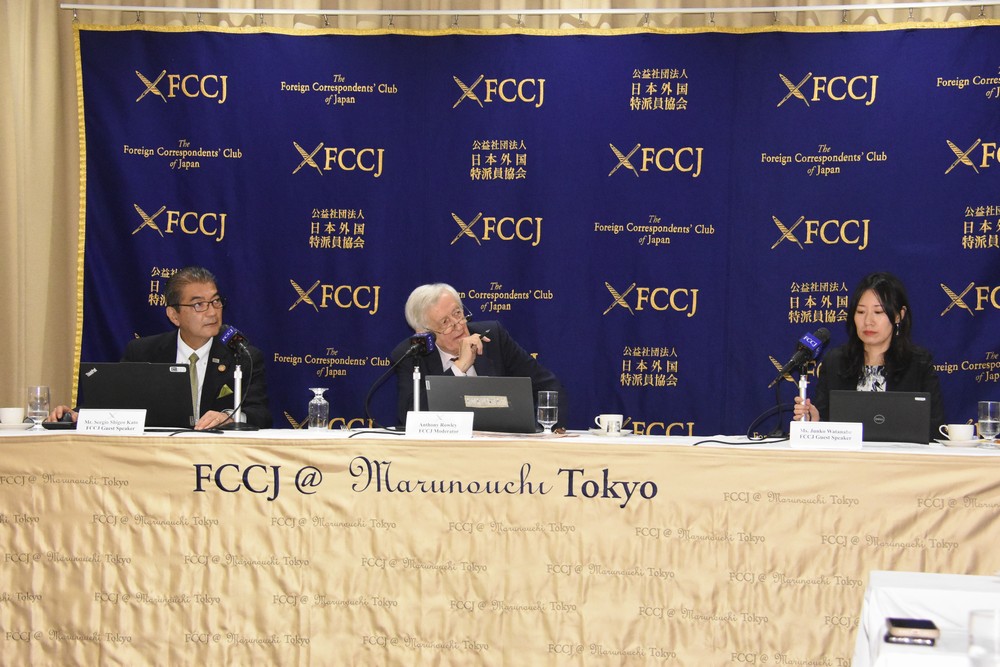Issue:
October 2025 | Deep Dive
UN court ruling requiring states to rein in fossil fuel use is a landmark in the fight against global heating, FCCJ Deep Dive event hears

Can anything stop, or even slow, the seemingly inexorable progress of global warming? At the end of a sizzling summer, an FCCJ Deep Dive event looked at the possibility of legal action being taken to “lower the temperature” – at stake, nothing other than the future of humankind.
More moderate approaches have so far failed. The 2015 Paris Agreement, in which 195 UN member states pledged to limit global warming to less than 2C ( and preferably 1.5C) above pre-industrial levels, has already been breached in many places.
Voluntary approaches to this and other environmental targets – such as the UN’s Sustainable Development Goals (SDGs) and so-called ESG (Environmental Social and Governance) goals - are also being honoured more in breach than in the observance.
So, can legal restraints succeed where these and other largely voluntary measures are perceived to have failed? This was the question addressed by five prominent experts who examined the likely efficacy of a ruling in July by the UN International Court of Justice (ICJ) holding governments responsible for limiting global warming.
The consensus was that while the ICJ ruling was not legally binding in the sense that the court can judge and punish individual countries and entities for breaching UN-agreed climate targets, it creates a legal precedent that will allow individual or collective parties to sue offending businesses and governments.
To date, the most high-profile action has been that brought against oil major Royal Dutch Shell in the Netherlands, although many other private legal actions are already underway or being planned. Panelists at the Deep Dive event noted that more than 2,000 such actions are currently underway.
The HCJ ruling “recognized that there are fundamental constitutional human rights to protection against climate change”, said Junko Watanabe, a lawyer and corporate advisor on sustainability issues.

“This kind of climate change litigation is now found elsewhere, especially in the United States. Australia and many countries in the European region. If global warming exceeds 1.5 degrees Celsius, the enjoyment of multiple human rights will be threatened.
“It's an international standard for businesses about how to respect human rights in their business. It says the company should respect internationally recognized human rights, which means the rights recognized under international human rights law.”
Fletcher Harper, an episcopal priest and executive director of the international environmental coalition Green Faith, noted that the ruling against Royal Dutch Shell four years ago “had real consequences for the company, one of the largest fossil fuel companies in the world when it was told that what it was doing to mitigate climate change was insufficient”.
The judgement “recognized that climate pollution is not only immoral it is also legally wrong. It invokes the danger of punishment for doing what is wrong”.
Harper added: “We must be realistic and [accept that] people, institutions and governments do not only act based on the best of intentions or a commitment to what is right. They also act at a times out of fear of punishment.
“The fossil fuel industry has enormous entrenched power economically and politically around the world and they’ve used that in both subtle and extraordinarily blatant ways. This creates a conundrum both on the legal and policy levels, but also at the psycho-spiritual level. It puts people into a state of suspended animation where they wonder if the changes that are needed can really happen.”
The use of litigation to address climate change goes back to the beginning of the century, when a group of university students in the Pacific Islands started a movement for climate justice, according to Neshan Gunasakera, an international lawyer who specializes in climate issues.
The Pacific Island Students' Climate Change Movement triggered a global movement that in March 2023 led the 132 members of the UN General Assembly to co-sponsor a resolution asking the ICJ for an advisory opinion on the obligations of states regarding climate change.
The advisory opinion pulls together various previous laws affecting climate and environmental issues - from human rights legislation to the law of the sea and other environmental laws - and is seen as carrying authority given that it comes from the UN’s highest court.
“The International Court of Justice advisory opinion puts pressure on companies to commit to accelerate their climate actions” under threat of legal actions from various parties, said Shigeo Kato, co-representative of the Japan Climate Initiative and senior advisor to the Renewable Energy Institute.
“It is urgent [that we] work in solidarity with a national government to enhance the global climate actions policies as an ambitious loop between non-state actors and governments.
“Thanks to this ICJ advisory opinion, together with our our ambitious non-state actors pressure, we expect this will be an extremely good opportunity for the government and society to change their minds.”
Yukari Takamura, a professor at the University of Tokyo, said: “Here we have the most highly respected international court in the world issuing a well-reasoned, deeply thought-through advisory opinion in which it examined with intellectual rigour and integrity multiple arguments about the issue at hand.”
Anthony Rowley is a columnist and contributor for the South China Morning Post.

